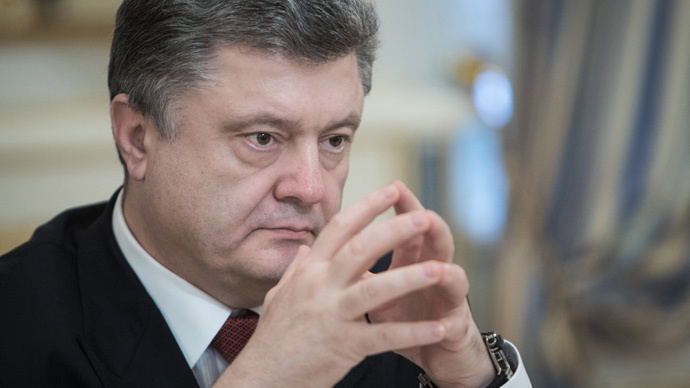‘Poroshenko’s political life hangs in the balance’

President Poroshenko of Ukraine is trying to walk a fine line between an extreme right fascist position to uphold for his political survival in Ukraine, and a more conciliatory tone he has to take internationally, says geopolitical analyst Eric Draitser.
RT:Speaking in a BBC interview, President Poroshenko said Ukraine needs to prepare itself to repel a Russian offensive. Are we likely to see a growing military buildup on the Ukrainian side?
Eric Draitser: It’s entirely possible. But I think that what we are actually seeing are let’s say the machinations of a very precarious situation for the Ukrainian government, for Poroshenko, a very difficult situation and an unenviable one. Because on the one hand he has an economy that’s collapsing, he has a war that he knows he cannot win, and on the other hand he has extremists on the far right wing in the body politic of Ukraine who represents a very serious threat to his own government. So in many ways he sees a political and an economic situation collapsing around him and he pushes forward with really the only possible path that he sees he can take which is escalation and threats. Because he understands that any escalation on the part of the Ukrainians or even on the part of the rebels of Donetsk and Lugansk, any escalation is going to make the political situation internationally more difficult thereby giving Kiev cover and essentially buying time for himself. Now on the one hand Poroshenko has really put himself into a corner because of a lot of the rhetoric that he has employed in the BBC interview and elsewhere. If you put that against the words that we’ve seen from the US Secretary of State John Kerry, which to some degree has been conciliatory, if you put that against the words of Merkel and some of the other European officials…
READ MORE: Poroshenko says Minsk deal ‘pseudo-peace’, vows to fight to the last drop of blood
So in many ways Poroshenko is really trying to walk a fine line between an extreme right wing militant fascist position - which he has to uphold for his own political survival domestically - and a more conciliatory pragmatic tone which he has to take internationally and that’s what you see when he says that he has to negotiate with Russian President Putin. So he is really talking out of the both sides of his mouth because quite frankly he has no other choice.
RT:European powers and Germany in particular seem to be more optimistic than the Ukrainian government? Is it surprising?
ED: No, it’s not surprising at all because the words you hear from them are reflective of their respective political positions. In Europe you see a situation where the industrial capitalists, those who have a vested interest in getting away from sanctions, in ratcheting down the rhetoric, in restoring ties with Russia, they have a vested interest in all of these things and they are pushing Merkel to get to not only a conciliatory position but to get back to normalized relations. There cannot be normalized relations between Europe and Russia, or specifically Germany and Russia, until you see a de-escalation in Ukraine, until you can not only get to the negotiation table but that you can come up with something substantive not this wishy-washy ceasefire agreement which sometimes holds and sometimes doesn’t, which the Ukrainians sometimes adhere to and sometimes don’t, but actual substantive negotiations leading to a substantive solution. If you can get to that point then from the European perspective it’s a tremendous victory. Now with regard to Ukraine it’s a very different situation because Poroshenko’s political life hangs in the balance to a large degree; and remember this is what happens when you get into bed with these extreme right fascist type groups. They uphold the extreme right flank in the political arena and Poroshenko unfortunately for him is beholding to them to a large degree.
READ MORE: Civilian killed in intense Ukrainian army shelling of Donetsk despite ceasefire
Also at least one civilian was killed in the recent shelling in the city of Donetsk. The ceasefire under the Minsk agreement now seems to be in danger. For more on this RT talked to Michael Bociurkiw, spokesperson for the OSCE Special Monitoring Mission to Ukraine.
“…The most intensive shelling that our monitors observed was around Donetsk railway station, near the airport it came down a little bit. But to put things into perspective, [on Monday] for example the shelling during the day time lasted several hours and perhaps there were a hundred plus explosions. But it has to be said that recently on heavier days, and it’s very unfortunate that the shelling… the number of explosions our monitors heard have been around a thousand. Also we have to talk a little bit about Shirokino, a Ukrainian village near Mariupol, which has been under shelling for many weeks, the civilians there are suffering terribly. The OSCE Special Monitoring Mission to Ukraine is working on a project to bring about de-escalation there…”
The fragile truce in Ukraine has been largely holding since February. Nevertheless, there were incidents of violence.
“We do know that recently there has been the reintroduction of Grad missiles and multiple launch rocket systems and of course these are the types of weaponry that cause severe damage to civilian areas.” “We have good days, we have bad days. There are areas which are no longer being shelled and our monitors have gone there and they have managed to help to arrange access for humanitarian aid or for the repair of utilities.”
The statements, views and opinions expressed in this column are solely those of the author and do not necessarily represent those of RT.
The statements, views and opinions expressed in this column are solely those of the author and do not necessarily represent those of RT.












